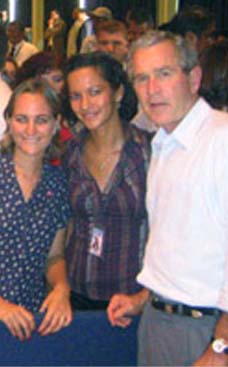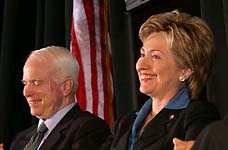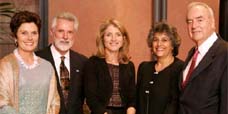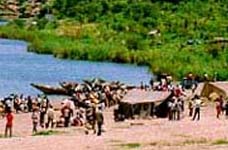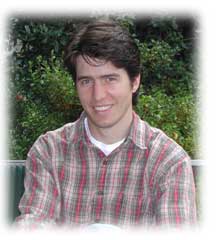
About a third of Ghana's 21 million inhabitants are either Muslim or animistic, and nearly everyone else is Christian. As with many other countries in West Africa, evangelism has put down firm roots, and its fervor seems contagious. Coming into the town of Nkawkaw, about midway from Accra to Kumasi, was a roadside car parts shack called My Savior Radiator Repairs. A bit further on, we passed a green passenger van with "Super Jesus" stenciled across its windshield. Just across the street, next to a billboard for Presbyterian University College, was a banner calling for young Muslims to join the Atakbir Allahu Akbar Youth Association, which meets on Fridays mornings from 5:25 till 5:55. Austin Merrill is a journalist who served as a Peace Corps Volunteer in Ivory Coast.
Austin Merrill writes "Letter from Ghana"
LETTER FROM GHANA
In West Africa, a Synagogue Where the Pavement Ends
By Austin Merrill
October 28, 2005
There is a road in southwestern Ghana that heads straight into the setting sun as it leaves the city of Kumasi in the direction of Ivory Coast. It is a remarkably good road, by West African standards — wide and paved and lightly traveled. Its few vehicles, for the most part, are passenger-jammed vans or cargo trucks heading for port, laden with timber, cocoa or bauxite.
Turn left at the town of Bibiani, at the edge of the storied gold-rich Ashanti Kingdom, and the road soon narrows as it rises and falls with the rolling hills. Adults and children stop what they're doing to watch a car go by, the kids waving and calling out "obruni" — "white person" in Twi, the local language. Eventually you come to the town of Sefwi Wiawso. Follow the road as it twists down the steep backside of a hill, and there, right where the pavement gives way to a packed dirt track, is the Tefereth Israel Synagogue.
New Adiembra, the Jewish neighborhood in Sefwi, looks no different from countless other communities in this part of West Africa. It sits on a slope at the edge of the thick forest, still high enough to allow a view into the valley. One-story concrete homes line the grass-and-dirt courtyards, and crisscrossing paths provide shortcuts through town or lead out to the surrounding farmland tucked in among the trees. Children play soccer wherever there's room to kick a ball, goats and chickens are free to roam about, and women walk by with heavy loads balanced on their heads — bundles of firewood, or enormous basins filled with water from the pump at the bottom of the hill.
The small Jewish community is unique in Ghana. David Ahenkorah, 52, is the leader of the synagogue. "They call me a rabbi, but I just call myself a teacher," Ahenkorah said. "I haven't been trained." He said the locals' ancestors were Jews who crossed the Sahara Desert from North Africa many centuries ago, ending up in what is today Ivory Coast before moving east to Sefwi. Over the years, people apparently lost track of their Jewish roots. But somehow they maintained some Jewish customs, including burying people immediately on their death and avoiding meats considered unclean, like pork and bush rat.
"And when I was a boy," Ahenkorah said, "I started to notice that on Saturdays there was no noise. No one did anything that resembled doing a job."
Ahenkorah told of how, about 30 years ago, a local man named Aaron had a vision that told him he was part of a lost tribe of Israel. Aaron traveled to Ivory Coast and to Liberia to research Judaism, but he fell ill and died in 1991 before establishing a sustainable synagogue. Ahenkorah took up the charge, and eventually he made contact with Jewish communities in the United States. With the help of some of those communities, the New Adiembra group built a synagogue in 1998. Today that synagogue has a membership of about 20 families, or about 200 people.
In late July I traveled to Sefwi with Miriam Rosenthal, who owns a business in Ghana that erects roadside billboards. Rosenthal's parents, Holocaust survivors from Poland who came to America in 1950, died recently, and she wanted to do something for the Sefwi community in their honor. So in her luggage — along with some books donated by the Jewish Publication Society — she packed a sewing machine for Benjamin Baidoo, a tailor in Sefwi who makes African-styled challah covers that are sold on the Internet to raise money for the community.
To make it to Sefwi in time for the Sabbath, we had to leave our hotel near Accra, Ghana's seaside capital, at 5 a.m. The thoroughfare from Accra to Kumasi is notoriously packed with traffic, and our bus lurched along with the other vehicles, ultimately taking more than six hours to cover the 160-odd miles. Outside of Accra towns are low-slung jumbles of concrete — peak-roofed buildings left over from Great Britain's colonial reign, or newer rectangular boxes topped with corrugated zinc. The rare wealthy family might live in a walled-off villa, with broken bottles or jagged windowpane shards cemented into the top of the enclosure for security.
Children and their parents walked along the road on the way to their fields, barefoot or in flip-flops and with a machete and a burlap sack slung over their shoulders. One disoriented old man wandered onto the asphalt, drawing a sharp horn blast from our bus driver. The man just shook his cane at us and swept it through the air like a sword fighter directing traffic.
About a third of Ghana's 21 million inhabitants are either Muslim or animistic, and nearly everyone else is Christian. As with many other countries in West Africa, evangelism has put down firm roots, and its fervor seems contagious. Coming into the town of Nkawkaw, about midway from Accra to Kumasi, was a roadside car parts shack called My Savior Radiator Repairs. A bit further on, we passed a green passenger van with "Super Jesus" stenciled across its windshield. Just across the street, next to a billboard for Presbyterian University College, was a banner calling for young Muslims to join the Atakbir Allahu Akbar Youth Association, which meets on Fridays mornings from 5:25 till 5:55.
We got off our bus in Kumasi and looked for transport for the last 100 miles to Sefwi. Waiting for one of those passenger vans might have put us in Sefwi after the 6 p.m. sunset, so we paid about $50 to rent a taxi, left Kumasi at 1:30 p.m., and pulled into Sefwi less than three hours later.
Our host was Joseph Armah, 43, a local farmer and photographer. On the wall of his living room, near a clock stuck at 10:00, hung a framed sign that read "Welcome to Shalom House." A menorah sat on a shelf near the sofa, and on top of the television was a miniature flag of Israel and a small stuffed pillow, made in the shape of a Torah scroll. On the doorframe of his bedroom, Armah recently had affixed a mezuza.
The television was shut off at sunset, and we gathered for a prayer service to begin the Sabbath. Armah couldn't join us; a few days earlier, an American visitor to Sefwi had died after apparently contracting typhoid, and because Armah had been with the body he said he had to wait seven days before he'd be considered clean enough to worship with others. So the service was led by Armah's 17-year-old son, Albert, who wore a dark-blue yarmulke and read aloud from "Becoming Jewish: A Handbook for Conversion," by Rabbi Ronald H. Isaacs. Albert's seven siblings joined in, singing what little Hebrew they knew. They lit two candles, cut slices from a loaf of locally made bread, and poured Coke and Sprite into glasses to substitute for wine. After prayers, they proudly showed off the guest book, full of messages from scores of visitors — mostly Americans and Europeans — who'd spent time in Sefwi over the past few years.
Saturday's service began at 8:30 a.m. The synagogue is a rectangular concrete building, recently painted a brilliant blue and white to match the Israeli flags that hang above the doorways. A center aisle divides the two sections of hand-carved wooden pews: the five pews to the left for men, the five to the right for women. The men wear prayer shawls retrieved from a cardboard box near the door. The children sit in the first couple of pews on each side; the back pews are reserved for the adults.
Like Armah, David Ahenkorah recently had been with the body of the deceased American visitor, so he was not present for the service. Two young men led readings from a prayer book that was donated in 1989 by a synagogue in Iowa, according to a sticker inside the back cover. The Torah reading came from Numbers 25, and each sentence was read aloud three times. The first reading was in Twi, from a Bible that had been translated into the language by Christian missionaries. The sentence was then read in English, and finally was translated yet again into the colloquial mixture of Twi and English that is most commonly used by people in the area.
The sun came out from behind the clouds, and the bare metal roof — lashed to exposed wooden beams with wire — clicked and popped in the heat. The children in the front pew grew restless as the service went on, whispering with one another, turning to stare at me and swatting at a horsefly. An adult came from a back pew to discipline them.
Most of the rest of the day was spent eating, napping and lazily watching the day drift by from Armah's front porch. Later, after the Sabbath was over, Rosenthal sat down with Ahenkorah and Armah to go over the profits from the sale of the challah covers and to discuss what else they could make with the new sewing machine. Ahenkorah's main goal is to build a Jewish school for the community's children. Recently he acquired about 40 acres from a local chief, but he hasn't yet raised the necessary funds to begin construction.
"Some of us are able to read some Hebrew, but we don't understand it," Ahenkorah said, Bible in his hand and white yarmulke frayed at the edges.
Armah's 15-year-old son, Patrick, echoed the need for a school. He's learned some Hebrew songs and phrases from Jews who've visited Sefwi, but he's forgotten a lot. For now, he and his friends attend a local Christian school. "When they have their prayers, I fake it," Patrick said. "I just meditate."






